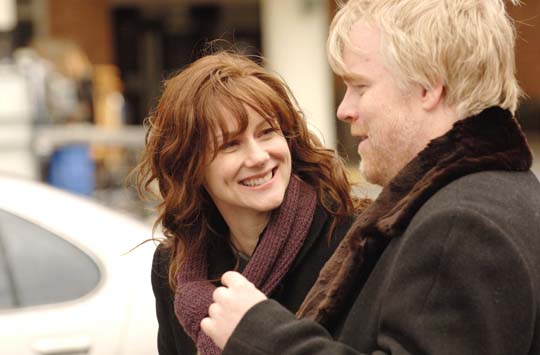|
Reviews of Recent Independent, Foreign, & Documentary Films in Theaters and DVD/Home Video
Written & Directed by Tamara Jenkins. Produced by: Ted Hope, Anne Carey & Erica Westheimer. Director of Photography, Mott Hupfel. Edited by Brian A. Kates. Music by Stephen Trask. Released by Fox Searchlight. USA. 113. Rated R. With Laura Linney, Philip Seymour Hoffman & Philip Bosco. Fans of Tamara Jenkins’s darkly hilarious debut feature Slums of Beverly Hills will be eagerly lured by the previews for The Savages. Slums addressed how love, pain, loyalty, and disillusionment co-exist in a family, and how even a deeply flawed, somewhat estranged family is still, in some ways, bound together. Slums’s teen brother and sister came of age in the 1970s – the Savages could be the same pair, grown up but messed up, too dysfunctional to have full adult lives. Both early middle-aged, Jon (Philip Seymour Hoffman) and Wendy Savage (Laura Linney) are forced to deal with their ageing father’s dementia. It has been years since either one as seen him. Jon – a schlumpy, commitment-phobic Brecht scholar in Buffalo – insists on confronting his father’s mortality without sugarcoating it. Wendy – a flailing, neurotic Manhattan temp and aspiring playwright – wants to make things pretty and nice. The Savages, like Slums, zeroes in on the wry humor and pathos of its characters. But despite strong performances from the three leads, it is ultimately a less profound, less satisfying film. The issues faced by adults with a sick parent – watching a once-abusive, once-powerful man become helpless and confused, or finding a nursing home for the care that he needs without experiencing deep guilt – are effectively addressed with depressing realism. Yet the film skims over opportunities to give a deeper, richer view of the characters, or of the family’s past. Although the Savages edge toward fuller lives over the course of the film – with Wendy, in particular, ending a dead-end affair and finding a breakthrough in her career – their transformations aren't drawn with the psychological complexity that Jenkins achieved in Slums. The connection between the Savage siblings’ adult dysfunction and troubled childhood is assumed, but not intricately explored. Some moments – for example, a vignette of Jon in his university classroom – ring so false that I was pulled out of the movie. Other scenes, such as those addressing Wendy's attempts to leave her cat at her father's nursing home, come across as half-baked or dull. The Savages is ultimately one of those films in which all of the strongest, funniest, most moving moments are collected in the three-minute trailer, which makes the film look like a slyer, more grown-up Little Miss Sunshine, but the two-hour feature itself drifts and drags in comparison.
The prospect of offering an honest, humorous look at a nearly universal experience – the illness of a parent – has great promise, and
The Savages is a credible attempt to take it on. Slums of Beverly Hills was so good because it got under the itchy skin of an
American family. The Savages has moments that are that effective, that funny, and that true, but
ultimately, it just never cuts as deep.
Elizabeth Bachner
|

